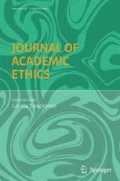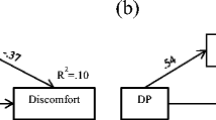Abstract
Using a parallel mixed-methods design, the current study examined university students’ perceptions of academic cheating through collecting and analyzing both the quantitative and qualitative data. Our quantitative findings corroborate previous research that male students have engaged more in academic cheating than females based on students’ self-reports, and that undergraduate students are less willing to discuss issues on academic cheating as compared with their graduate counterparts. Five themes emerged from the thematic analysis of the qualitative data: (1) flexible definitions for cheating, (2) environmental promotion of cheating, (3) the moral transgression of cheating, (4) cheating as an ambiguous justification, and (5) cheating as a conscious decision making process. The mixed-methods findings indicate that there is no relationship between students’ gender or classification and their endorsements of the qualitative themes. However, non-White students are more likely to endorse the theme “cheating as an ambiguous justification.” Implications for reducing and preventing academic cheating at the university level are discussed.
Similar content being viewed by others
References
Brandão, M. F., & Teixeira, A. A. C. (2005). Crime without punishment: An update review of the determinants of cheating among university students. Working Papers (FEP)-Universidade do Porto, 83, 1–31.
Braun, V., & Clarke, V. (2006). Using thematic analysis in psychology. Qualitative Research in Psychology, 3, 77–101.
Cohen, J. (1988). Statistical power analysis for the behavioral sciences (2nd ed.). Hillsdale, NJ: Lawren Earlbaum Associates.
Creswell, J. W., & Plano-Clark, V. L. (2011). Choosing a mixed methods design. In J. W. Creswell & V. L. Plano-Clark, Designing and conducting mixed methods research (pp. 53–106). Thousand Oaks, CA: Sage.
De Bruin, G. P., & Rudnick, H. (2007). Examining the cheats: The role of conscientiousness and excitement seeking in academic dishonesty. South African Journal of Psychology, 37(1), 153–164.
Dweck, C. S., & Leggett, E. L. (1988). A social-cognitive approach to motivation and personality. Psychological Review, 95, 256–273.
Elias, R. Z. (2009). The impact of anti-intellectualism attitudes and academic self-efficacy on business students’ perceptions of cheating. Journal of Business Ethics, 86, 199–209.
Field, A. (2009). Discovering statistics using SPSS (3rd ed.). Thousand Oaks, CA: Sage Publications.
Graham, M. A., Monday, J., O’Brien, K., & Steffen, S. (1994). Cheating at a small college: An examination of student and faculty attitudes and behaviors. Journal of College Student Development, 35, 255–260.
Gross, E. R. (2011). Clashing values: contemporary views about cheating and plagiarism compared to traditional beliefs and practices. Education, 132(2), 435–440.
Hollinger, R. C., & Lanza-Kaduce, L. (2009). Academic dishonesty and the perceived effectiveness of countermeasures: An empirical survey of cheating at a major public university. NASPA Journal, 46(4), 587–602.
Kibler, W. L. (1993). Academic dishonesty: A student development dilemma. NASPA Journal, 30, 252–267.
Lawson, R. A. (2004). Is classroom cheating related to business students’ propensity to cheat in the real world? Journal of the American Academy of Business, 8, 142–146.
Magnus, J. R., Polterovich, V. M., Danilov, D. L., & Savvateev, A. V. (2002). Tolerance of cheating: An analysis across countries. Journal of Economic Education, 33(2), 125–135.
McCabe, D. L. (2005). It takes a village: Academic dishonesty and educational opportunity. Liberal Education, 9(3), 26–31.
McCabe, D. L., Butterfield, K. D., & Trevino, L. K. (2006). Academic dishonesty in graduate business program programs: prevalence, causes, and proposed action. Academy of Management Learning & Education, 5(3), 294–305.
McCabe, D. L., Trevino, L. K., & Butterfield, K. D. (2002). Honor codes and other contextual influences on academic integrity: A replication and extension to modified honor code settings. Research in Higher Education, 43(3), 357–378.
Miller, M. T., & Nadler, D. P. (2006). Student governance and institutional policy: Formation and implementation. New York, NY: Information Age Publishing.
Moore, M. (1991). Cheating 101: The benefits and fundamentals of earning the easy “A”. Hopewell, NJ: Moore Publishing.
Owunwanne, D., Rustagi, N., & Dada, R. (2010). Students' perceptions of cheating and plagiarism in higher institutions. Journal of College Teaching and Learning, 7(1), 59–68.
Saulsbury, M. D., Brown, U. L., Heyliger, S. O., & Beale, R. L. (2011). Effect of dispositional traits on pharmacy students’ attitude toward cheating. American Journal of Pharmaceutical Education, 75(4), 1–8.
Smyth, L. S., & Davis, J. R. (2004). Perceptions of dishonesty among two-year college students: Academic versus business situations. Journal of Business Ethics, 51, 62–73.
Tittle, C. R., & Rowe, A. R. (1974). Fear and the student cheater. Change, 6(3), 47–48.
Volpe, R., Davidson, R., & Bell, M. C. (2008). Faculty attitudes and behaviors concerning student cheating. College Student Journal, 42(1), 164–175.
West, T., Ravenscroft, S. P., & Shrader, C. B. (2004). Cheating and moral judgment in the college classroom: A natural experiment. Journal of Business Ethics, 54, 173–183.
Willen, M. S. (2004). Reflections on the cultural climate of plagiarism. Liberal Education, 90(4), 55–58.
Zhou, R., & Zhou, X. (2007). On the cause of university students’ cheating phenomenon from the perspective of Albert Bandura’s reciprocal determinism. US-China Education Review, 4(5), 7–10.
Author information
Authors and Affiliations
Corresponding author
Additional information
Author Note
Tianlan Wei, Steven Chesnut, and Lucy Barnard-Brak, Department of Educational Psychology and Leadership, Texas Tech University; Marcelo Schmidt, Doctoral Support Center, College of Education, Texas Tech University. Tianlan Wei is now at Department of Counseling and Educational Psychology, Mississippi State University.
Rights and permissions
About this article
Cite this article
Wei, T., Chesnut, S.R., Barnard-Brak, L. et al. University Students’ Perceptions of Academic Cheating: Triangulating Quantitative and Qualitative Findings. J Acad Ethics 12, 287–298 (2014). https://doi.org/10.1007/s10805-014-9219-x
Published:
Issue Date:
DOI: https://doi.org/10.1007/s10805-014-9219-x




